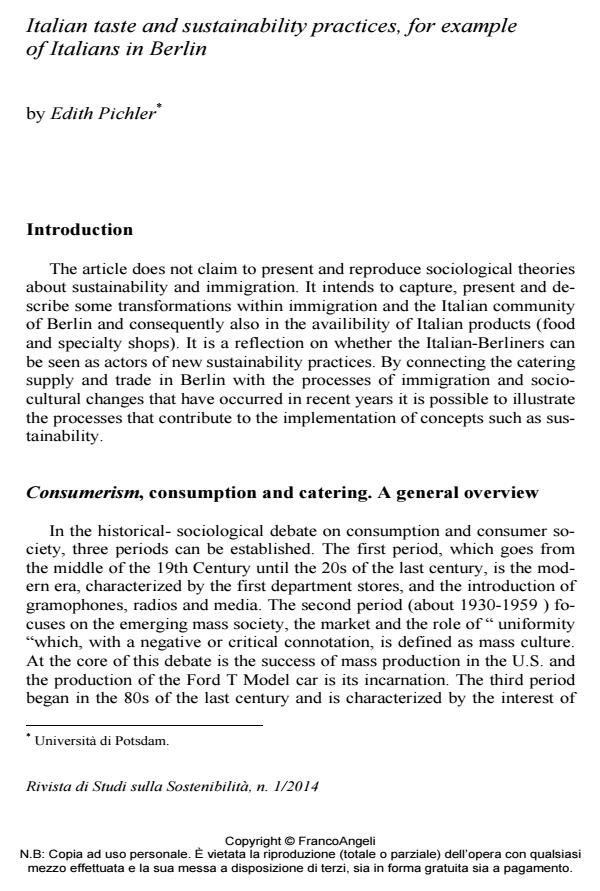Italian taste and sustainability practices, for example of Italians in Berlin
Titolo Rivista RIVISTA DI STUDI SULLA SOSTENIBILITA'
Autori/Curatori Edith Pichler
Anno di pubblicazione 2014 Fascicolo 2014/1 Lingua Inglese
Numero pagine 10 P. 169-178 Dimensione file 144 KB
DOI 10.3280/RISS2014-001010
Il DOI è il codice a barre della proprietà intellettuale: per saperne di più
clicca qui
Qui sotto puoi vedere in anteprima la prima pagina di questo articolo.
Se questo articolo ti interessa, lo puoi acquistare (e scaricare in formato pdf) seguendo le facili indicazioni per acquistare il download credit. Acquista Download Credits per scaricare questo Articolo in formato PDF

FrancoAngeli è membro della Publishers International Linking Association, Inc (PILA)associazione indipendente e non profit per facilitare (attraverso i servizi tecnologici implementati da CrossRef.org) l’accesso degli studiosi ai contenuti digitali nelle pubblicazioni professionali e scientifiche
Germany, as well as Italy and the rest of Western Europe, after the Second World War experiences Americanization of a consumption and becomes a consumer society. Italian Catering successfully develops and finds its place in this new of consumption democracy. In the meantime, we can observe a paradigm shift with regard not only to the debate on consumption and consumerism but also to its practices, where the ecological consequences of consumerism have now taken on a global aspect.
Anche la Germania, come l’Italia e il resto dell’Europa occidentale, conosce dopo la seconda guerra mondiale una americanizzazione del consumo che la vede trasformarsi in una società dei consumi. La Ristorazione italiana s’inserisce con successo e trova un suo spazio in questa nuova democrazia dei consumi. Nel frattempo possiamo osservare un cambiamento paradigmatico riguardo non solo al dibattito sul consumo e il consumismo ma anche alle sue pratiche, dove le conseguenze ecologiche del consumismo hanno ormai assunto un aspetto globale.
Keywords:Consumismo-globalizzazione, migrazioni e nuove mobilità, Berlino, stili di vita, ecologia, regionalismo
- Andersen A. (1997). Mentalitätswechsel und ökologische Konsequenzen des Konsumismus. Die Durchsetzung der Konsumgesellschaft in den fünfziger Jahren. In Siegrist H., Kaelble J., Kocka J. (Hg.). Europäische Konsumgeschichte, Frankfurt-New York: S.763-791.
- Asfur A., Osses D. (2003). Neapel – Bochum – Rimini. Arbeiten in Deutschland. Urlaub in Italien. Essen.
- Bourdieu P. (1987). Die feinen Unterschiede. Kritik der gesellschaftlichen Urteilskraft, Frankfurt a.M.
- Brewer J. (1997). Was können wir aus der Geschichte der früheren Neuzeit für die moderne Konsumgeschichte lernen? In Siegrist H., Kaelble J., Kocka J. (Hg.). Europäische Konsumgeschichte, Frankfurt-New York: S.51-74.
- Corni G., Dipper C. (a cura di) (2006). Italiani in Germania tra Ottocento e Novecento: Spostamenti, rapporti, immagine, influenze, Bologna.
- Hirschfelder G. (2001). Europäische Esskultur: Eine Geschichte der Ernährung von der Steinzeit bis heute, Frankfurt a.M.-New York.
- IHK-Berlin (2012). International Business in Berlin, Berlin.
- Kaelble H. (1997), Europäische Besonderheiten des Massenkonsums 1950-1990). In Siegrist H., Kaelble J., Kocka J. (Hg.). Europäische Konsumgeschichte, Frankfurt-New York: S.169-203.
- Kammerer P. (1976). Sviluppo del capitale ed emigrazione in Europa: La Germania Federale, Milano.
- Möhring M. (2012). Fremdes Essen: Die Geschichte der ausländischen Gastronomie in der Bundesrepublik Deutschland, Oldenburg.
- Pichler E. (2011). Die Italiener in Berlin und ihr Selbstverständnis als neue Europäer. In Janz O., Sala R. (Hg.). Dolce Vita? Das Bild der italienischen Migranten in Deutschland, Frankfurt a.M.-New York: 277-295.
- Pichler E. (2011a). Ethnic economics: the Italian enterpreneurs in Germany. In Chiapparino F. (Hg.). The Alien Entrepreneur, Milano: S.54-82.
- Pichler E. (2013). Berlino dal Recycling urbano alla promozione della diversity. In Lambertini A. (a cura di). Urban Beauty! Luoghi prossimi e pratiche di resistenza estetica, Bologna: S.241-242.
- Pichler E. (2014). Von Gastarbeiter/-innen zu neuen Mobilen. Soziale Milieus der italienischen Migration. In Pfeffer-Hoffmann C. (Hg.). Arbeitsmigration nach Deutschland, Berlin: S. 417-448.
- Prontera G. (2009). L’esperienza migratoria dei lavoratori italiani nella Repubblica federale tedesca nel secondo dopoguerra, Milano.
- Siegrist H., Kaelble J., Kocka J. (1997). Europäische Konsumgeschichte, Frankfurt-New York.
- Siegrist H. (1997). Konsum, Kultur und Gesellschaft im modernen Europa. In Siegrist H., Kaelble J., Kocka J. (Hg.). Europäische Konsumgeschichte, Frankfurt-New York: S.13-48.
- Schildt A. (1997). Freizeit, Konsum und Häuslichkeit in der “Wiederaufbau”- Gesellschaft. Zu Moderniesierung von Lebenstilen in der Bundesrepublik Deutschland in den 1950er Jahren. In Siegrist H., Kaelble J., Kocka J. (Hg.). Europäische Konsumgeschichte, Frankfurt-New York: S.327-348.
- Schwendter R. (1995). Arme Essen-Reiche Speisen. Neuere Sozialgeschichte der zentraleuropäische Gastronomie, Wien.
- Wildt M. (1997). Die Kunst der Wahl. Zur Entwicklung des Konsum in Westdeutschland in den 1950er Jahren. In Siegrist H., Kaelble J., Kocka J. (Hg.). Europäische Konsumgeschichte, Frankfurt-New York: S.307-348.
- Wyrwa U. (1997). Consumption, Konsum, Konsumgesellschaft. Ein Beitrag zur Begriffsgeschichte. In Siegrist H., Kaelble J., Kocka J. (Hg.). Europäische Konsumgeschichte, Frankfurt-New York: S.747-762.
Edith Pichler, Italian taste and sustainability practices, for example of Italians in Berlin in "RIVISTA DI STUDI SULLA SOSTENIBILITA'" 1/2014, pp 169-178, DOI: 10.3280/RISS2014-001010